Originally posted on November 18, 2023 @ 6:19 am
Have you ever found yourself in the middle of cooking a dish only to realize that you’re out of ginger powder? Don’t worry, you’re not alone. Whether you’re looking for a substitute due to dietary restrictions, unavailability, or simply to experiment with new flavors, we’ve got you covered. In this comprehensive guide, we’ll explore the best alternatives to ginger powder that are readily available in the United States.
Ginger powder, made from dried and ground ginger root, adds a distinct flavor and aroma to recipes and is commonly used in a variety of dishes. However, if you’re unable to find ginger powder or prefer to try something different, there are several alternatives you can use.
Table of Contents
Key Takeaways
- There are several ginger powder substitutes readily available in the US.
- Fresh ginger root, ground ginger, and ginger paste are popular alternatives to ginger powder.
- Other spices such as cardamom, nutmeg, cinnamon, and allspice can be used as ginger powder substitutes in certain recipes.
- Experiment with different substitutes to discover new tastes and adapt them to suit your recipes and personal preferences.
- Adjust the quantity of substitutes based on personal preference and the intensity of the flavor profile.
Understanding Ginger Powder and Its Uses
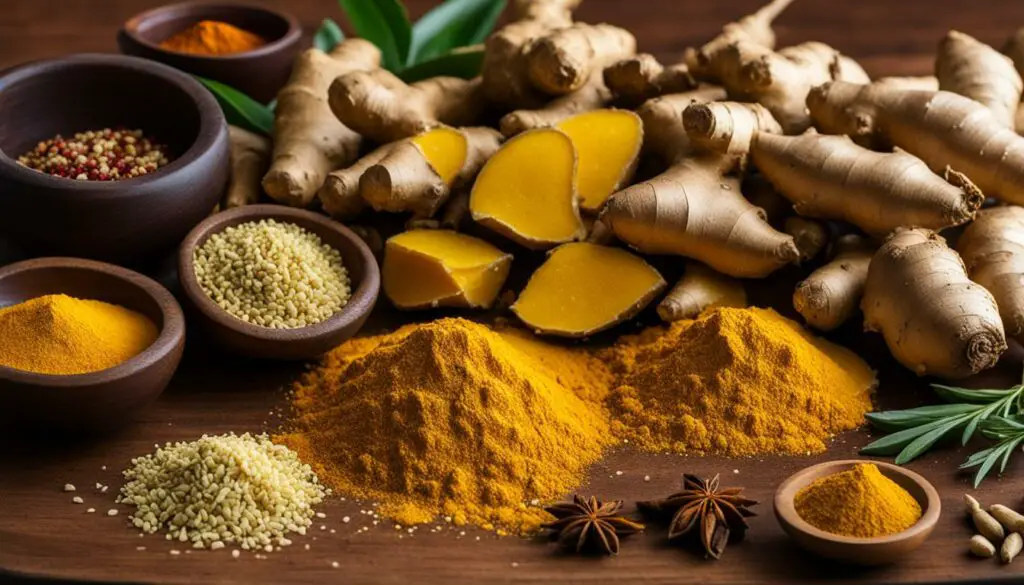
If you’re wondering about the best substitutes for ginger powder, it’s essential to understand what ginger powder is and how it’s commonly used in cooking. Ginger powder is made by drying and grinding ginger root, resulting in a fine powder with a distinct flavor and aroma.
Most recipes that call for ginger powder require it for its spicy, warm, and slightly sweet taste. However, it’s not uncommon to be out of ginger powder or have dietary restrictions that prevent its use. In such cases, you can consider using one of the ginger powder replacements below.
Tip: In most cases, you can substitute fresh ginger root for ginger powder. Use one tablespoon of fresh ginger for every quarter teaspoon of ginger powder.
What Can I Use Instead Of Ginger Powder?
In case you’re out of ginger powder, here are some substitutes you can use instead:
| Substitute | Quantity | Flavor Profile |
|---|---|---|
| Fresh Ginger Root | 1 Tbsp for every 1/4 tsp of ginger powder | Spicy, Warm, Slightly Sweet |
| Ground Ginger | 1 tsp for every 1/4 tsp of ginger powder | Less Intense Flavor, Similar Spiciness |
| Crystallized Ginger | 1 Tbsp for every 1/4 tsp of ginger powder | Sweet, Intense Flavor |
| Ginger Paste | 1 Tbsp for every 1/4 tsp of ginger powder | Milder Flavor, Similar Consistency |
| Fresh Turmeric | 1 Tsp for every 1/4 tsp of ginger powder | Earthy, Slightly Bitter, Spicy |
| Cardamom | 1 Tsp for every 1/4 tsp of ginger powder | Aromatic, Slightly Sweet, Warm |
| Nutmeg | 1/4 tsp for every 1/4 tsp of ginger powder | Warm, Slightly Sweet |
| Cinnamon | 1 tsp for every 1/4 tsp of ginger powder | Warm, Sweet, Aromatic |
| Allspice | 1/4 tsp for every 1/4 tsp of ginger powder | Warm, Sweet, Spicy, Complex |
Whether you choose to use fresh ginger root, ground ginger, or other ginger powder alternatives ultimately depends on your preference and recipe requirements. Don’t hesitate to experiment with multiple substitutes to create new flavor profiles and find your go-to for future recipes.
Fresh Ginger Root as a Substitute
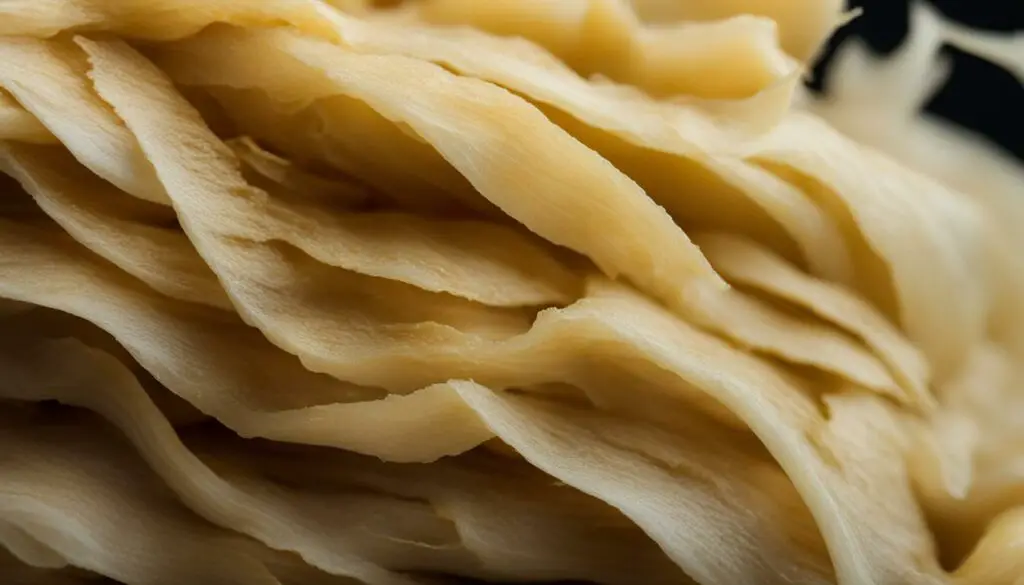
When it comes to finding a suitable substitute for ginger powder in cooking, fresh ginger root is one of the top contenders.
With its robust taste, similar flavor profile, and ease of use, fresh ginger root can work wonders in various dishes. It can be grated, minced, or sliced, and added to soups, stews, marinades, and more.
However, keep in mind that using fresh ginger root may require some adjustments in quantity and preparation. Since fresh ginger has a different texture and consistency than ginger powder, it may affect the overall texture of your dish.
To use fresh ginger root as a substitute for ginger powder, start by selecting a piece of ginger that is firm, smooth, and unblemished. Peel the ginger skin with a vegetable peeler or a spoon, and then slice, dice, or mince it according to your recipe’s needs.
Generally, fresh ginger root is more potent than ginger powder, so start with a smaller quantity and adjust accordingly. For instance, if a recipe calls for one teaspoon of ginger powder, you can use roughly one tablespoon of grated fresh ginger root.
Fresh ginger root can also have a spicier taste than ginger powder, so be cautious if you’re sensitive to heat. Taste your dish as you add the fresh ginger root, and adjust the quantity to your liking.
Uses of Fresh Ginger Root as a Substitute
Here are some examples of how you can use fresh ginger root as a substitute for ginger powder in recipes:
| Recipe | Description |
|---|---|
| Ginger tea | Steep fresh ginger slices in hot water for a soothing and aromatic tea. Add lemon and honey to taste. |
| Stir-fry | Add minced fresh ginger root to a hot wok or pan along with your favorite vegetables, protein, and sauce. |
| Marinade | Combine grated fresh ginger root, soy sauce, honey, garlic, and vinegar for a flavorful and tenderizing marinade for meats. |
With its versatility, tangy aroma, and numerous health benefits, fresh ginger root is a great alternative to ginger powder.
Ground Ginger as an Alternative
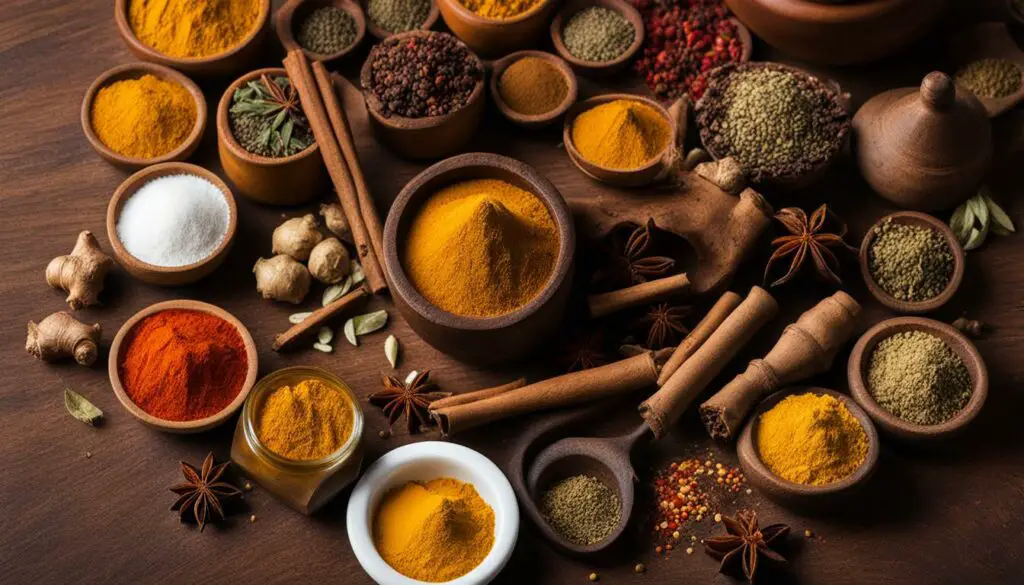
If you’re out of ginger powder and fresh ginger root, ground ginger can be a suitable alternative. Ground ginger is made by drying and grinding fresh ginger root, resulting in a texture similar to ginger powder. While the flavor may not be as intense as fresh ginger, it can still provide a hint of spiciness and warmth to your recipes. Remember to adjust the quantity accordingly, as ground ginger might have a stronger or milder taste depending on the brand and quality.
Here’s a quick comparison table for using ground ginger as a substitute for ginger powder:
| Ingredient | Quantity for Substitution | Notes |
|---|---|---|
| Ginger Powder | 1 teaspoon | – |
| Fresh Ginger Root | 1 tablespoon finely grated | Adjust the quantity based on personal preference |
| Ground Ginger | 1 teaspoon | The taste may vary depending on the brand and quality |
As you can see from the table, using ground ginger as an alternative to ginger powder is fairly easy. Just keep in mind the taste differences and make necessary adjustments.
Tip: You can also try mixing ground ginger with a small amount of fresh lemon or lime juice to enhance its flavor and aroma.
Natural Alternatives to Ginger Powder: Try Crystallized Ginger for a Sweet Twist
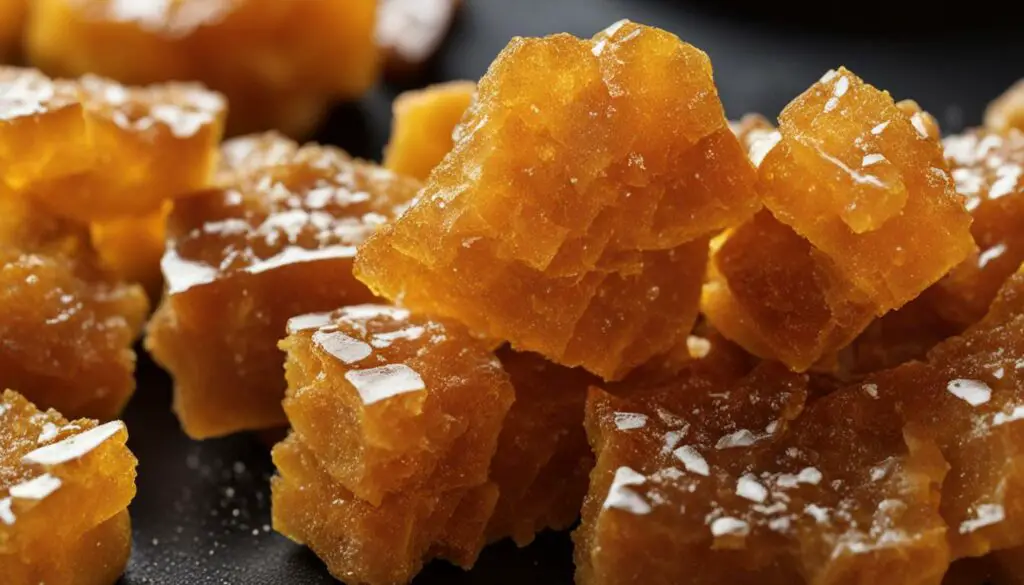
If you’re in search of a natural alternative to ginger powder that can also add sweetness to your dishes, look no further than crystallized ginger. This delicious ingredient can be used in a variety of recipes and is readily available in most grocery stores.
What is Crystallized Ginger?
Crystallized ginger is made by cooking fresh ginger root in a sugar syrup and then coating it in sugar crystals. The result is a sweet and spicy treat that can be enjoyed on its own or used to add flavor to recipes.
Using Crystallized Ginger in Recipes
When using crystallized ginger as a substitute for ginger powder, it’s important to keep in mind that its sweetness may affect the overall taste of your dish. Here are some tips for incorporating crystallized ginger into your recipes:
- Chop the crystallized ginger into small pieces and use it as a topping for oatmeal, yogurt, or baked goods.
- Grind the crystallized ginger into a powder-like consistency and use it in place of ginger powder in recipes such as gingerbread, spice cakes, or smoothies.
- Add chopped or ground crystallized ginger to marinades, dressings, or glazes for a sweet and spicy twist.
When substituting crystallized ginger for ginger powder in a recipe, start with a small amount and adjust to taste. Keep in mind that crystallized ginger may not provide the same level of spiciness as ginger powder and may require additional spices or seasonings to achieve the desired flavor profile.
“Crystallized ginger adds a unique texture and a more intense sweetness compared to ginger powder.”
Health Benefits of Crystallized Ginger
In addition to its delicious taste, crystallized ginger also offers potential health benefits. Ginger has been shown to have anti-inflammatory and antioxidant properties and may help with nausea, digestion, and pain relief.
However, it’s important to note that crystallized ginger contains added sugar and should be consumed in moderation as part of a balanced diet.
Ginger Paste for Convenience
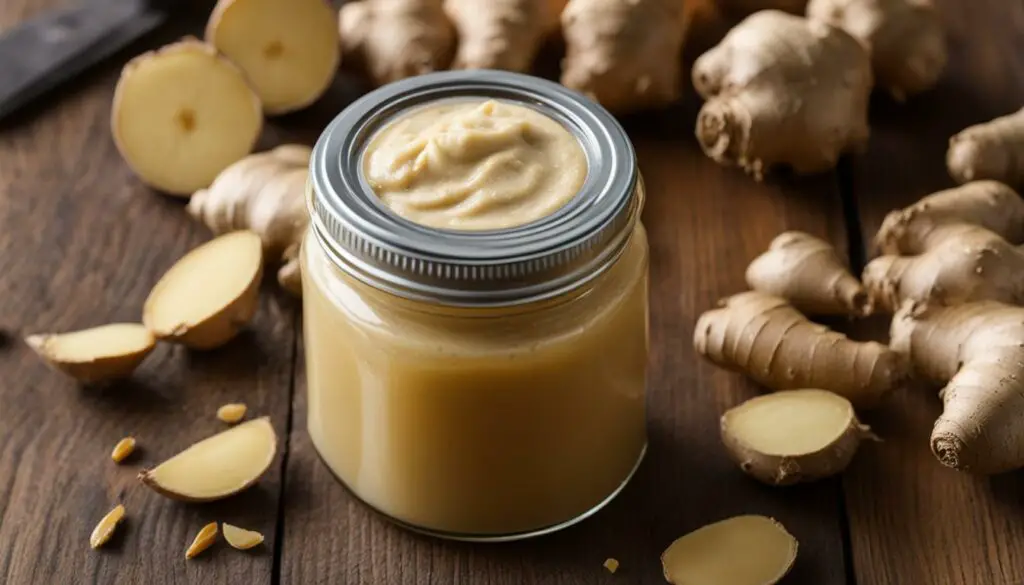
If you’re looking for a quick and easy substitute for ginger powder, ginger paste can be a great option. Ginger paste is a blend of fresh ginger root and either water or oil, creating a smooth and easy-to-use ingredient. It’s similar in consistency to tomato paste, making it easy to measure and incorporate into recipes.
One of the benefits of ginger paste is its convenience – there’s no need to peel, chop, or grate fresh ginger root. Additionally, it can last longer in the refrigerator than fresh ginger, making it a great option for those who don’t use ginger often but still want the flavor in their cooking.
While ginger paste has a similar taste to ginger powder, it may be slightly milder. As with all substitutes, it’s important to adjust the quantity used according to personal preference.
Ginger paste is versatile and can be used in a variety of dishes, including marinades, sauces, stir-fries, and more. It’s also a great addition to ginger-based drinks and desserts.
“I love using ginger paste in my stir-fries – it saves so much time and adds the perfect amount of flavor!” – Sarah, Home Cook
Pros:
- Convenient to use
- Longer shelf life than fresh ginger root
- Can be used in a variety of dishes
Cons:
- May have a milder taste than ginger powder
- Not a suitable substitute for raw ginger in certain recipes
Using Fresh Turmeric as a Replacement
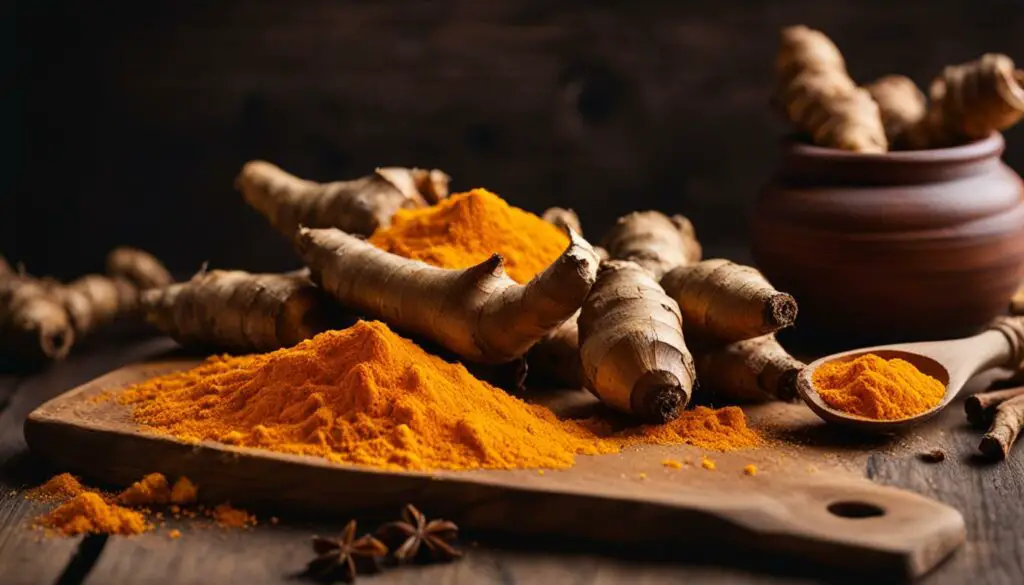
If you’re looking for a unique alternative to ginger powder, fresh turmeric might pique your interest. Commonly used in Southeast Asian cuisine, fresh turmeric is a close relative of ginger and can offer a similar flavor profile with a twist.
Fresh turmeric has a slightly earthy and bitter taste, with a hint of spiciness. It contains a compound called curcumin, which gives it a bright yellow color and is known to have potential health benefits such as reducing inflammation and aiding digestion.
When using fresh turmeric as a substitute for ginger powder, keep in mind that it might have a stronger taste and staining effect. Start with small quantities and adjust according to your personal preference.
To use fresh turmeric, simply peel off the skin with a vegetable peeler or the edge of a spoon and grate, mince, or slice it according to your recipe’s requirements.
Comparison Table: Fresh Turmeric vs. Ginger Powder
| Fresh Turmeric | Ginger Powder | |
|---|---|---|
| Taste | Earthy, bitter, slightly spicy | Spicy, warm, slightly sweet |
| Texture | Firm, with a staining effect | Fine powder |
| Color | Bright yellow | Yellow-brown |
| Health Benefits | Potential anti-inflammatory and digestive aid properties | May help with nausea and pain relief |
As shown in the table above, fresh turmeric and ginger powder differ in taste, texture, and color. Fresh turmeric can offer potential health benefits, while ginger powder is known for its anti-inflammatory and anti-nausea properties.
When experimenting with fresh turmeric as a substitute for ginger powder, consider using it in combination with other spices to enhance its flavor and create a unique taste that complements your dishes.
Cardamom for a Fragrant Twist
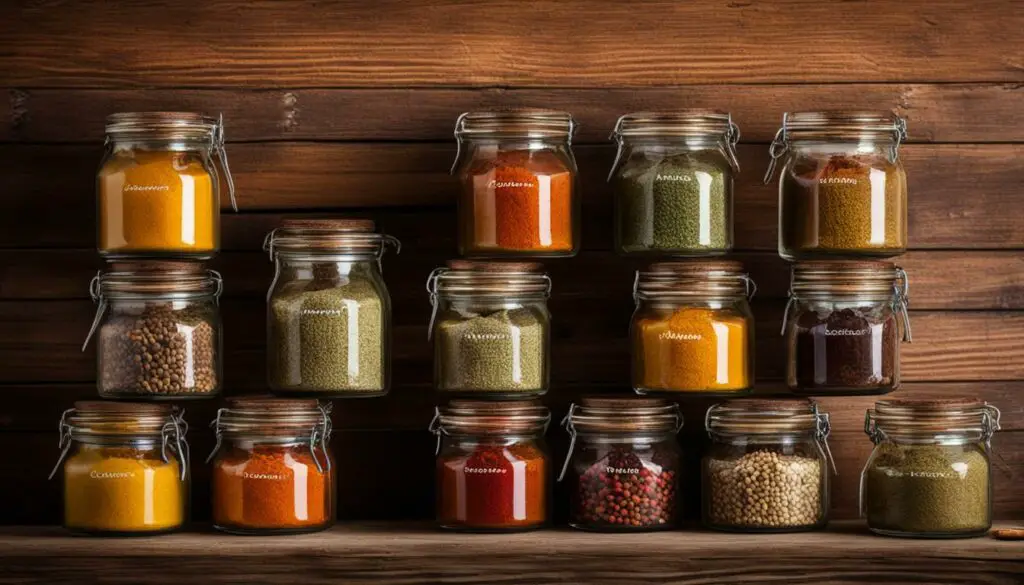
If you’re looking for a ginger powder substitute that can add a unique twist to your recipes, consider using cardamom. This versatile spice has a warm, aromatic, and slightly sweet flavor that pairs well with various cuisines. Though it might not have the exact taste of ginger, it can still add a delightful twist to your dishes.
Cardamom can be used in both sweet and savory dishes, making it a versatile option to keep in your spice collection. Start with smaller quantities of ground cardamom and adjust according to your desired flavor. Remember that a little goes a long way, so be careful not to overpower your dish with the spice’s strong flavor.
If you’re unsure of where to begin, try incorporating cardamom into your baked goods such as cakes, cookies, and bread. It can also be used to flavor tea, coffee, and other beverages, adding an exotic and fragrant twist to your drinks.
Tips for Using Cardamom as a Substitute for Ginger Powder:
- Start with smaller quantities of ground cardamom and adjust to your liking. Remember that cardamom has a strong flavor and a little goes a long way.
- Experiment with incorporating cardamom into your baked goods and beverages to add a unique twist.
- Pair cardamom with other spices such as cinnamon, nutmeg, and allspice to create a complex flavor profile.
“Cardamom is a versatile spice that provides a warm, aromatic, and slightly sweet flavor that can add a delightful twist to various dishes.”
Nutmeg for a Warm and Spicy Flavor
Nutmeg, with its warm and slightly sweet flavor, can be another interesting alternative to ginger powder. While it doesn’t have the same spiciness, it offers a distinct taste that complements both sweet and savory dishes.
To use nutmeg as a ginger powder replacement in recipes, start with smaller amounts and adjust to your liking. Ground nutmeg tends to have a strong flavor, so use it sparingly to avoid overpowering your dish.
“Adding a pinch of nutmeg to your pumpkin pie recipe can provide a unique twist to the classic dessert.”
Nutmeg pairs well with cinnamon, cloves, and other warm spices, making it a suitable ginger powder substitute in recipes that call for a combination of spices.
Whether you’re experimenting with new flavors or simply looking to replace ginger powder in a recipe, nutmeg can be an excellent option. Try using it to add warmth and complexity to your next culinary creation.
Natural Alternatives to Ginger Powder: Cinnamon to Add Warmth
If you’re looking for a warm and sweet flavor to replace ginger powder in your recipe, cinnamon could be an excellent substitute. Although it won’t provide the exact ginger taste, it can add a cozy and aromatic element to your dishes. Cinnamon is a widely used spice that pairs well with various desserts and baked goods.
To use cinnamon as a substitute for ginger powder, start with smaller quantities and gradually increase the amount if desired. Keep in mind that cinnamon has a strong flavor and aroma, so use it sparingly to avoid overpowering your dish.
If you’re making a savory recipe that calls for ginger powder, cinnamon may not be the best substitute. However, for sweet dishes such as cookies, cakes, or muffins, cinnamon can add warmth and depth to the flavor profile.
Incorporate cinnamon into your recipe in a way that complements the other ingredients. It can be used in combination with other spices such as nutmeg or allspice for a more complex flavor profile.
Overall, cinnamon is a natural alternative to ginger powder that can add a warm and sweet flavor to your dishes. Experiment with different substitutes and find the one that suits your taste preferences and recipe requirements.
Allspice for a Complex Flavor Profile
Allspice is another excellent alternative to ginger powder, thanks to its warm and slightly sweet taste that combines flavors reminiscent of cinnamon, cloves, and nutmeg. It can be used in combination with other spices to add complexity and depth to your dishes.
Allspice is derived from dried unripe berries and is commonly used in Caribbean, Middle Eastern, and Latin American cuisine. Its unique flavor can complement a wide range of dishes, from savory stews to sweet desserts.
| Pros | Cons |
|---|---|
|
|
To use allspice as a ginger powder substitute, start with smaller quantities and gradually increase the amount until you achieve your desired flavor. It can be used in combination with other spices such as cinnamon, nutmeg, or cardamom to create a unique blend.
Allspice can be found as whole berries or in ground form at most grocery stores or specialty spice shops. Store it in an airtight container in a cool, dry place for maximum flavor retention.
Conclusion
Cooking with ginger powder adds a distinct flavor and aroma to many dishes, but sometimes it may not be available or suitable. In such cases, it’s good to know that there are several substitutes you can use to achieve similar or different tastes. Fresh ginger root, ground ginger, crystallized ginger, ginger paste, fresh turmeric, cardamom, nutmeg, cinnamon, and allspice are just a few options you can explore.
Experiment and Adapt
When trying out different substitutes, it’s essential to keep in mind that the quantity and texture may vary compared to ginger powder. Additionally, some spices may have a stronger flavor, while others have a milder taste. Fortunately, experimenting with substitutes can lead to exciting new tastes and culinary creations.
As you adapt these substitutes to your favorite recipes and personal preferences, always remember to adjust the quantity, texture, and taste accordingly. This way, you can create dishes that not only taste delicious but also suit your dietary requirements, cultural preferences, and adventurous spirit.
Final Thoughts
We hope this guide has been helpful in providing insights into the best substitutes for ginger powder in the United States. Whether you’re seeking convenience, taste variation, or dietary alternatives, you never have to feel limited by the availability of ginger powder.
So go ahead and experiment with the substitutes, add your twist to traditional recipes, and explore new gastronomic possibilities. With these substitutes, you can elevate your cooking game and impress your taste buds and those of your loved ones.
FAQ
What is ginger powder?
Ginger powder is made from dried and ground ginger root, known for its distinct flavor and aroma.
Why would I need a substitute for ginger powder?
There are several reasons you might need a substitute for ginger powder, such as dietary restrictions, unavailability, or simply to experiment with new flavors.
Can I use fresh ginger root as a substitute for ginger powder?
Yes, fresh ginger root is one of the best substitutes for ginger powder. It offers a similar flavor profile and can be grated, minced, or sliced to be used in recipes.
How can I use ground ginger as an alternative to ginger powder?
Ground ginger can be used as a substitute for ginger powder. It is made by drying and grinding fresh ginger root and can provide a hint of spiciness and warmth to your recipes.
What is crystallized ginger and how can I use it as a substitute?
Crystallized ginger is fresh ginger root that has been cooked in sugar syrup and coated with sugar crystals. It offers a unique texture and a more intense sweetness compared to ginger powder. You can incorporate it into your recipes by chopping it into smaller pieces or grinding it into a powder-like consistency.
How can I use ginger paste as a substitute for ginger powder?
Ginger paste is a blended mixture of fresh ginger root and water or oil. Its consistency is similar to tomato paste, making it easy to measure and incorporate into recipes. However, keep in mind that ginger paste might have a slightly milder flavor than ginger powder, so consider adjusting the quantity accordingly.
Can I use fresh turmeric as a replacement for ginger powder?
Yes, fresh turmeric can serve as a substitute for ginger powder. It has a similar earthy and slightly bitter taste, with a hint of spiciness. Use it in the same quantities as ginger powder or adjust to your preference.
What is cardamom and how can I use it as a substitute?
Cardamom is a versatile spice commonly used in sweet and savory dishes. It provides a warm, aromatic, and slightly sweet flavor that pairs well with various cuisines. While it may not have the exact taste of ginger, it can still add a unique twist to your recipes. Experiment with ground cardamom by starting with smaller quantities and adjusting according to your desired flavor.
Can I use nutmeg as a substitute for ginger powder?
Yes, nutmeg can be an interesting alternative to ginger powder. It has a warm and slightly sweet flavor that complements both sweet and savory dishes. Use ground nutmeg sparingly, as its flavor can become overpowering if used excessively. Start with smaller amounts and adjust to your liking.
Can I use cinnamon as a substitute for ginger powder?
Cinnamon, known for its warm and sweet flavor, can serve as a substitute for ginger powder in certain recipes. Although it won’t provide the exact ginger taste, it can add a cozy and aromatic element to your dishes. Experiment with ground cinnamon by starting with smaller quantities and gradually increasing if desired.
What is allspice and how can I use it as a substitute?
Allspice combines flavors reminiscent of cinnamon, cloves, and nutmeg. Its warm and slightly sweet taste makes it a suitable substitute for ginger powder, especially when used in combination with other spices. Start with smaller quantities and adjust according to your desired flavor profile.
See also:
Leave a Reply